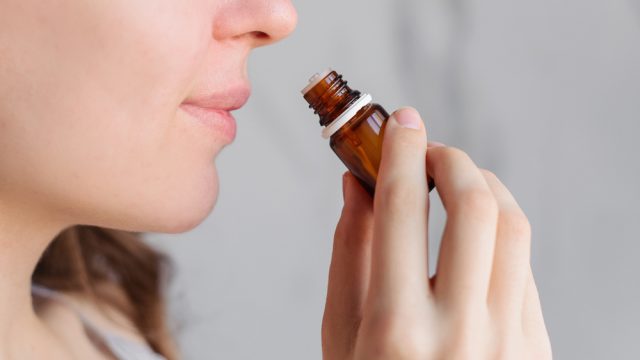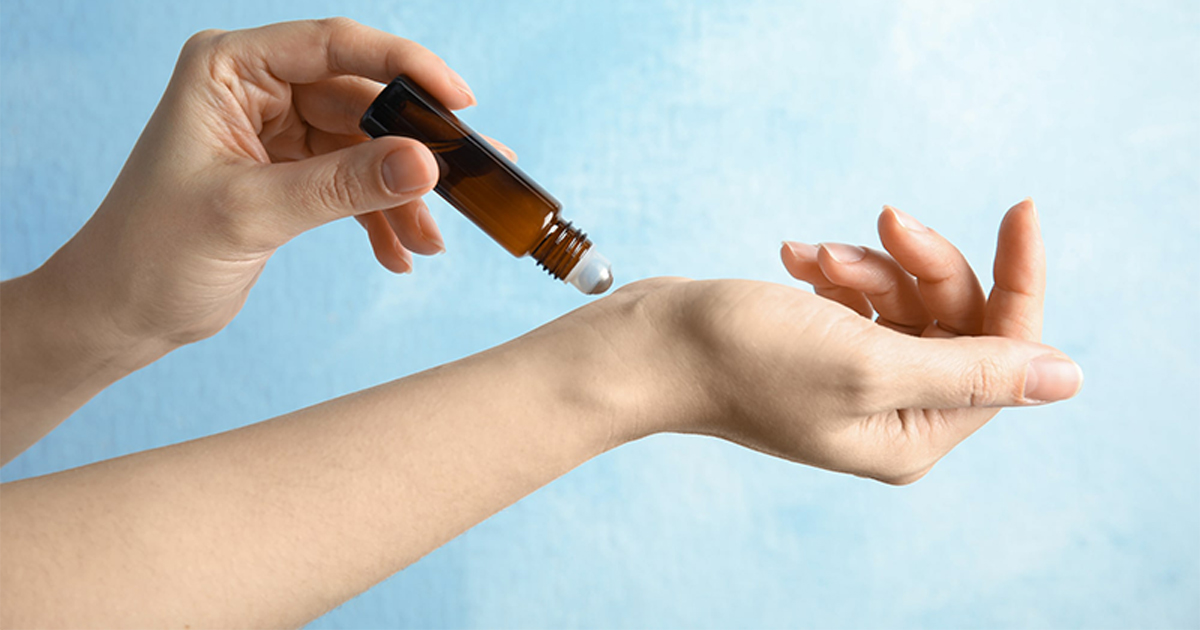
While option B ended up becoming my reality, I did also learn that essential oils work when used properly. (And I was decidedly not using tea tree oil for skin care properly.) Moreover, although every essential oil is billed as offering quite the slate of potential benefits, certain varieties have strengths backed by some scientific research. So to make the best use of your oils, it’s worth being aware of which have been studied for specific purposes, how the work, and in which ways they’re most effective.
Lucky for you, all that legwork is already done. Below, check out a crash course in how oils work.
Essential oils: A general refresher
“Essential oils are aromatic liquid substances that are extracted from different kinds of plant materials using the process of steam distillation,” says Amy Galper, aromatherapist . “What that means is that it takes a lot of plant material to yield a tiny amount of essential oils, so essential oils are highly concentrated and potent. They are made up of hundreds of different aromatic molecules, and when we inhale and smell them, they can have a profound affect on our emotions, psychology, and physical well being.”
That, friends, is aromatherapy, and Galper says the best way to reap the aromatic benefits of essential oils is to smell them by skin application (percutaneous absorption) or diffusing. “Both of these applications allow the tiny molecules that compose the essential oils to affect the body and mind.”
And while this process and therapy is natural, experts warn to use caution since “natural” isn’t always synonymous with “safe.” “The ramifications of percutaneous absorption are profound in aromatherapy, as dozens of essential oils contain therapeutic and symptom-relieving properties,” says chiropractor Eric Zielinski, DC, author of The healing Powers of essential oils and The Essential Oils Diet. ”Multiple clinical trials confirm their inflammation-reducing and pain-relieving efficacy, but safety must be take seriously. Only apply essential oils topically if properly diluted with a carrier oil.” (Carrier oils include olive oil, coconut oil, avocado oil, sunflower oil, sesame oil, and almond oil.)
And when it comes to ingesting your essential oils, by say, adding a few drops to your sparkling water? Maybe take pause. Aside from potentially aggravating your digestive tract, certain varieties can be pretty much toxic in effect. Add tea tree, eucalyptus, wintergreen, cinnamon, thyme, and oregano to your “no swallow” list.
So, do essential oil work? Which can I trust, and for which purposes?
Scientific research regarding the efficacy of essential oils is limited but certainly worth noting. Here are a few standout benefits of all-star oils, courtesy of Galper’s research at the New York Institute of Aromatherapy.

Peppermint oil
There are few things peppermint oil can’t do (like ride a bike or run for president). Where peppermint oil shines, though, is any sphere relating to pain management. Research points to peppermint oil being helpful for treating tension-type headaches, which makes sense since menthol, a key component in peppermint oil, is noted for alleviating migraines.
Furthermore, peppermint oil can be a helpful balm for treating a toothache. For this application, Galper advises swishing it around, mouthwash-style. The antibacterial and antimicrobial aspects can help heal any potential infections, and the cooling effect can help numb whatever’s bugging you.
Lavender oil
“Lavender is best known as an anti-inflammatory, and for wound healing and sedating the central nervous system,” Galper says.
On a personal level, lavender oil is a great tool for de-stressing, calming, and getting you ready for bed without forcing you to sleep. And, you don’t need to take my word and only my word for it: One recent study analyzing the effects of aromatherapy on people with anxiety disorders concluded that lavender had a short-term “calming effect without producing sedation.” Another small study of 158 postpartum women showed that inhaling lavender oil improved their sleep quality, including latency and duration.
As such, lavender oil is best served through a diffuser, whenever you’re having a little trouble winding down or dozing off.
Tea Tree Oil
Tea tree oil is, despite my pimple-laden issues with it, a dermatological godsend. It’s known for anti-fungal and anti-microbial qualities,which makes it a go-to for many a skin trouble. It can also be adept at treating bug bites, given that research suggests it has potential antihistamine properties.
To treat blemishes, though, exercise caution. If you have non-sensitive or oily skin, you can totally put a spot of tea tree oil directly on an errant pimple, Galper says. But, she adds, if you have super sensitive skin, it’s best blended with Palmarosa and geranium oils. And, as always, when in any kind of doubt, consult your dermatologist.
Eucalyptus Oil
Eucalyptus oil, a key ingredient of Vicks Vaporub, is one you’ll want to use during cold season. One 2013 study showed eucalyptus-oil inhalation to be effective for relieving respiratory system ailments like bronchitis, with potential for rhinosinusitis, chronic obstructive Pulmonary Disease (COPD), and asthma. This is because it has immune-stimulatory, anti-inflammatory, antioxidant, analgesic, and spasmolytic properties.
“Eucalyptus is best known as a mucolytic agent—which clears and thins mucus—and as an expectorant—which helps us cough out mucus out—and as an all-around antimicrobial,” Galper says.
So sure, inhale eucalyptus oil if you’re starting to feel a tickle in your throat, but head to the doctor if it’s starts feeling too scratchy to bear.
Think of aromatherapy as a vehicle for bolstering your wellness
So, again, do essential oils work? When they’re not used recklessly, and with knowledge of their limitations? Absolutely. Galper is quick to point out that aromatherapy isn’t a clear-cut “cure” for whatever ails you, even though some of the molecules are antiseptic, anti-inflammatory, astringent, analgesic, and sedating. The oils have healing properties, of course! But if essential oils are going to work, you must do your homework first to find the right oil to soothe, aid, relieve, and calm.
“Essential oils’ most powerful aspect is to support the body’s innate ability to heal itself,” Galper says. “It’s about helping to balance the body and mind and supporting our wellness. We all know that the stresses of everyday life can affect our well being, and using essential oils can help us manage how we respond and react so we don’t make ourselves sick.”
So, think of aromatherapy as less of a cure and more of a…well, therapy. It’s a highly personalized one at that and perhaps works best after consulting a professional. That said, it’s certainly worth a whiff.
Post time: Jan-11-2023

